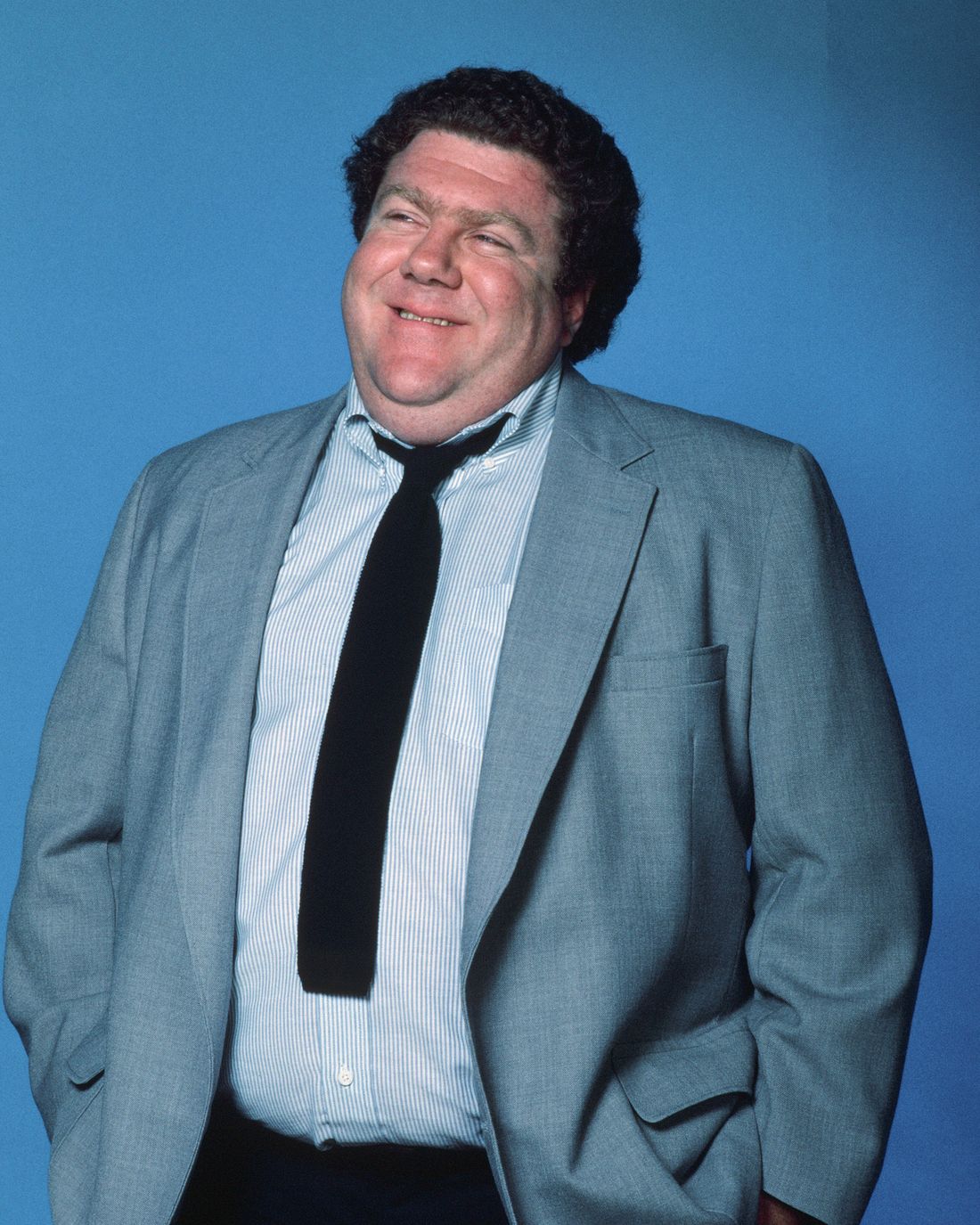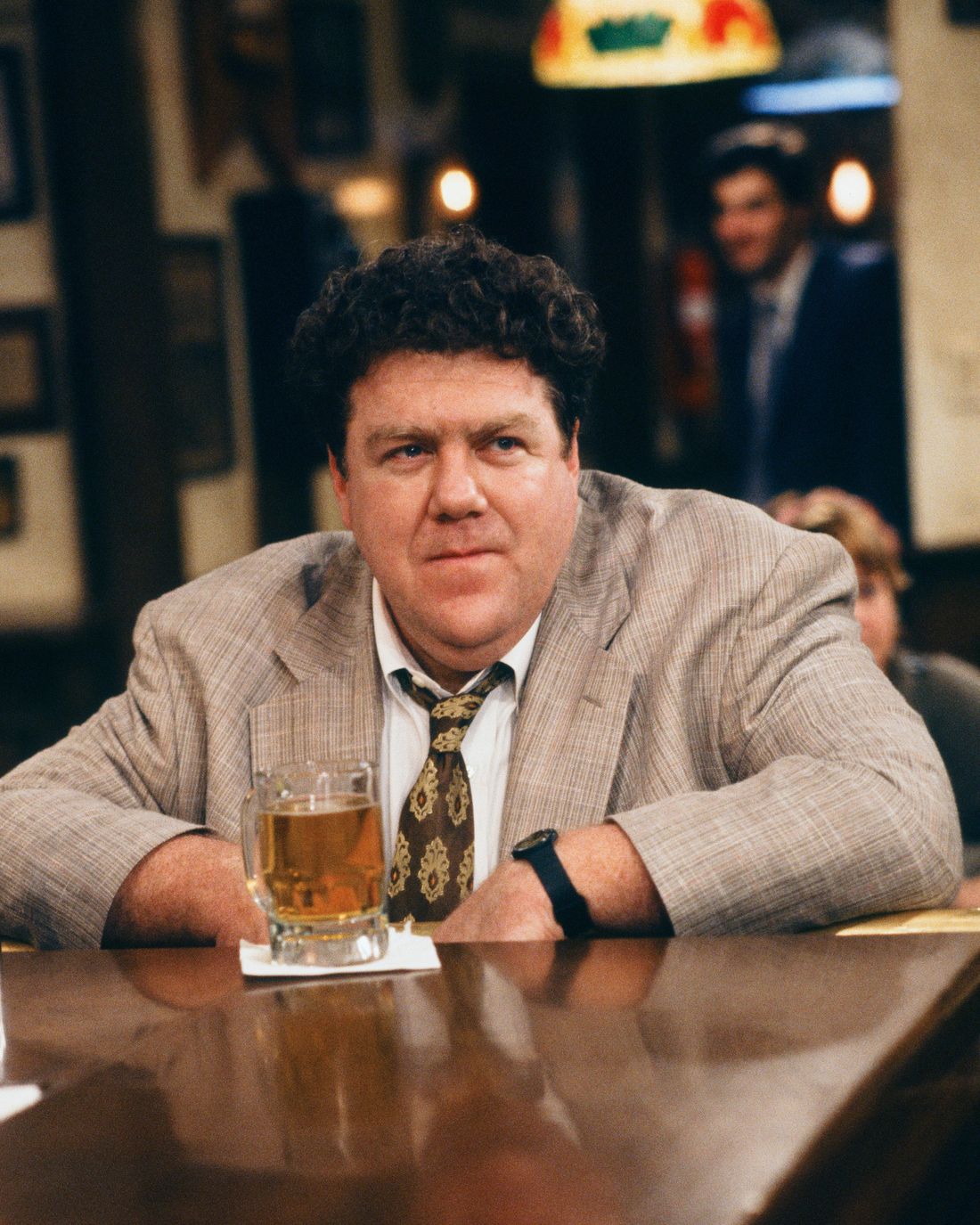
The opening theme of “Cheers” portrayed the bar as a place where everyone recognizes you. However, only one frequent patron was so cherished that his arrival triggered a unison shout of his name. This beloved character went by several nicknames: Norm, Norman Peterson, Normie, or Mr. Peterson (depending on who you asked at the bar). If Woody were the bartender, he’d call him George Wendt, the actor who played this easy-going, ordinary guy who enjoyed his drinks and bar friends. He joked about his weight, age, health, job, and marriage to Vera, being the only woman he’d ever been with.
As viewers got to know Norm better, they realized that beneath his casual demeanor lay a more intricate, even tragic character. Sadly, George Wendt, the man behind this character, passed away at 76 yesterday in his sleep due to unknown causes, according to his family.
From the very beginning when the show debuted in 1982 with “Give Me a Ring Sometime,” it was clear that the foundations of its main character’s greatness were already laid. In this initial episode, we witnessed the first of the 273 engaging conversations between Norm and the bar patrons after he walked in. Sam Malone, the bar owner and former Red Sox pitcher, played by Ted Danson, would always welcome Norm with a friendly callout: “How ya doin’, Norm? Whaddaya know?” To which Norm would respond humbly, “Not enough,” before settling into his usual spot.
In the opening scene, Wendt’s portrayal of Norm was so authentic that it captivated the writers and producers, leading them to continually discover deeper aspects of the character throughout the series’ 11 seasons. In the finale, an extraordinary accolade was given to Norm: He was allowed to establish the show’s underlying theme retrospectively. After another failed attempt by Sam to reconnect with Diane Chambers (played by Shelley Long), the dedicated fans stayed behind for a late-night cigar session before departing, leaving only Sam and Norm behind. As Norm approached the door to leave, he softly murmured, “She’ll always come back to you,” subtly hinting that Sam’s truest love was always Cheers itself.
The show initially adopted a less fashionable format – a half-hour sitcom structured similarly to a stage play – and elevated it to the caliber of classic screwball comedies from Hollywood’s early sound era. Directors like Howard Hawks, Preston Sturges, and Frank Capra would fill their stories with numerous quirky characters and orchestrate them with the precision of a pinball machine, resulting in an entertaining chaos where characters bounced off each other. The dialogue had a unique, predictable rhythm that viewers grew accustomed to, even though the specifics of how events unfolded were unpredictable. It was up to the actors to add tension or surprise through their performances. All cast members excelled in the precise timing required by this format, but Wendt stood out with his exceptional skill. Perhaps it was because he was able to elicit more impact with fewer actions, masterfully using well-timed pauses to make a humorous line land in another county. Whether Wendt was part of an ensemble or performing a duet with Sam, Diane, or other regulars, Norm was the bar’s unsung hero.

In a review for my local newspaper, the TV critic was the first to call actor George Wendt “the great” before his name. This wasn’t just a casual mention; it seemed like he was an established, well-respected character actor that I should have been familiar with, similar to Jack Warden or Walter Huston. However, as a young cinephile, I didn’t know Wendt from Norm, his breakout role on Cheers. It turns out that “the great” was used because the writer was genuinely impressed by him and wanted to make sure his name stood out.
In various genres, Wendt truly excelled, from comedies such as “Airplane II”, “Fletch”, “The Little Rascals”, and “Spice World”; memorable guest appearances on shows like “The Simpsons” and “Family Guy” (spoofing “Cheers”); relaxed, personal dramas like “Outside Providence”, “Somewhere in Time”, and the less-known “Lakeboat” (a salute to the crews of the Great Lakes penned by Wendt’s friend and fellow Chicagoan David Mamet); and programs driven by sketches such as “Portlandia” and “Saturday Night Live” (where Wendt was part of the “Bob Swerski’s Superfans”). However, among all his works, it was Norm that stood out most significantly in Wendt’s resume, earning him six Emmy nominations (regrettably, he did not win) and ensuring that he would never have to foot his own bill again.
Last night, I began watching episodes of Cheers centered around Norm’s character, planning to just scan through them. However, the depth of the character and the acting drew me in so much that I ended up spending the entire night watching every plot and subplot involving Norm. I was captivated by Wendt’s portrayal, noticing how his performance was spot-on from one scene to another, and appreciating how the character continued to unveil new aspects. The most intriguing aspect is the exploration of Vera, whom he often belittles as unattractive, disinterested in sex, materialistic, and stereotypically a nagging wife. However, in “Norman’s Conquest” (the episode where Norm is tempted to cheat on Vera), we discover that Norm’s jokes about his wife are habitual and unexamined. He has been socialized to make these jokes around other men and lacks the tools or self-awareness to change. There’s a classic Cheers moment in this episode when Norm tells Sam, “Those jokes about Vera aren’t even true. You know, like the one about the tentacles.” In a surprising confession to Sam, Norm admits, “I love my wife.” Despite his resolution to improve, Norm quickly rushes back to the room where he had a heart-to-heart with Sam and Diane, only to fetch a jacket for another Vera-related storyline, then exclaims, “Ohhhh shut up!” at the couple.
In essence, drama often revolves around characters undergoing transformations, whereas comedy frequently showcases characters who remain consistently unchanged. The character Norm, in iconic episodes like “Peterson Crusoe” and “The Executive’s Executioner” from season three, brilliantly illustrates this principle. In “Peterson Crusoe,” after a medical scare, Norm initially decides to abandon his life and escape to Bora Bora, only to ultimately back out and hide in Sam’s office for a week instead. Similarly, in “The Executive’s Executioner,” Norm agrees to take on a soul-crushing job as a hatchet man for his company after being offered triple pay, but then he threatens the executive that if the offer is combined with a dismissal threat, he will accept the job. However, he also asserted that he cannot be bought or threatened. This brief pause before making the deal hints at Norm’s consistent character despite the temptations presented to him.

The unchanging nature of Norm’s life might be detrimental if he’s trapped in a career deadlock, similar to his character in the show. However, when the consistent aspect is something positive and nurturing, like his long-lasting relationship with Vera, it can be beneficial. This notion is beautifully portrayed in scenes depicting their bond, as Bernadette Birkett, the actress who played Vera in real life, met Norm at Second City in 1974. Norm acknowledges that his life has fallen short of expectations, but when he reflects upon it, he recognizes that finding a lifelong partner in high school is an uncommon occurrence, and Vera’s loyalty deserves respect, even when his jokes may seem tactless, akin to Ralph Kramden. When Norm is apart from his friend Cliff (John Ratzenberger), there’s a hint of the existential ennui found in Waiting for Godot coupled with the comedic charm of Laurel and Hardy. Evaluated as an original character outside the context of the show and sitcom genre, Norm is a richly developed character that leaves a more profound impression after an episode concludes than during his comic mishaps on screen.
As time passes, Norm’s inherent kindness shines brighter and brighter. Despite his flaws, he’s a relatable mess that we all recognize. He still possesses an inner moral compass. This is evident when he leaves his demanding corporate job after realizing, with Diane’s assistance, that it was eroding the compassionate empathy that initially attracted his employers. In the fourth season’s “The Peterson Principle,” Norm deceives Vera upon learning she lost a promotion due to her bosses’ wives perceiving her as not refined enough for their circle. He tells her over the phone, “I’m a failure… Why don’t you just pack up and leave?” Then he confesses, “Even on a day like today, I feel like the luckiest man in the world because I married you.” Wendt’s performance consistently makes us empathize with Norm, capturing the pain of his struggles yet also the worth. His expressions often reveal more than the dialogue suggests – perhaps even things Norm himself may not fully understand. That critic was indeed insightful years ago: George Wendt was always exceptional, and he showed us this through his portrayal of Norm.
Read More
- Who Is Harley Wallace? The Heartbreaking Truth Behind Bring Her Back’s Dedication
- 50 Ankle Break & Score Sound ID Codes for Basketball Zero
- 50 Goal Sound ID Codes for Blue Lock Rivals
- Basketball Zero Boombox & Music ID Codes – Roblox
- Lottery apologizes after thousands mistakenly told they won millions
- Umamusume: Pretty Derby Support Card Tier List [Release]
- KPop Demon Hunters: Real Ages Revealed?!
- 100 Most-Watched TV Series of 2024-25 Across Streaming, Broadcast and Cable: ‘Squid Game’ Leads This Season’s Rankers
- Ultimate AI Limit Beginner’s Guide [Best Stats, Gear, Weapons & More]
- How to play Delta Force Black Hawk Down campaign solo. Single player Explained
2025-05-22 01:55